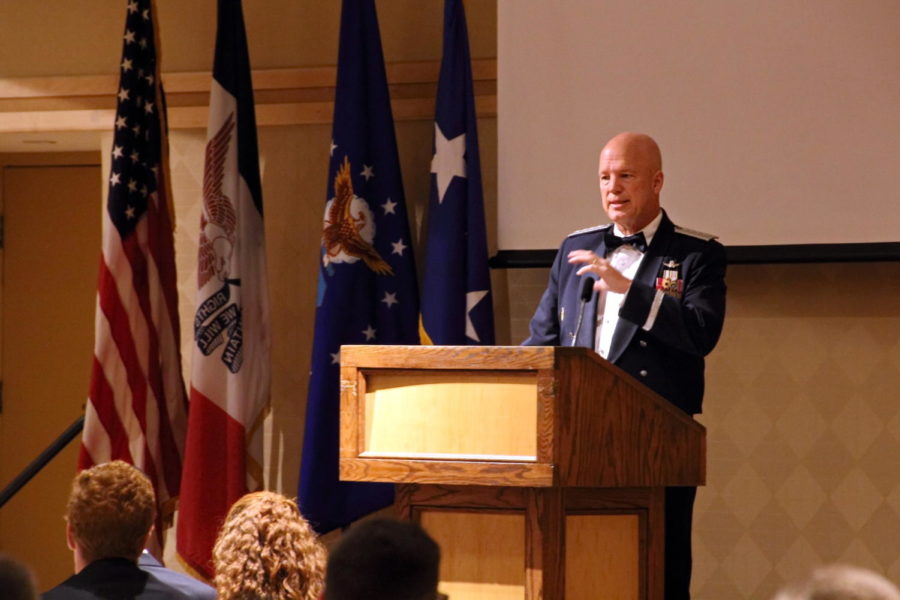Yedavalli: A Space Force is not the answer
Gen. John Raymond, Commander of the Air Force Space Command, speaks to cadets at the Air Force Dining Out celebration. Courtesy of Anna Haas
July 8, 2018
Over half a century after the United States sent its first man into space, President Donald Trump wants a more powerful, and overzealous, military presence in the starry skies. On June 18, he directed the Pentagon to establish a sixth military branch, the so-called Space Force, to ensure American dominance past our atmosphere.
The Space Force would be carved out of the Air Force and would be “separate but equal,” according to President Trump. Talking numbers, this new force would require more than 300,000 people and have a budget near $150 billion.
Hold your galactic horses, though. An executive order won’t be carried out without authorization from Congress, therefore, it may be a while before any formal decision is made.
This Space Force may not be what you’re thinking of. There are no plans to send a horde of space infantry to fight alongside Elon Musk’s Tesla Roadster.
However, our current dependence on space to house our vulnerable satellites is a real issue. The U.S. military depends on satellites including intelligence, communications, surveillance, navigation and even homing technology. That is a lot of dependence on objects floating around without much defense.
Satellites’ vulnerability can be showcased by the success of anti-satellite weapons (ASATs) tested by China, the United States and Russia. Each of these countries has destroyed one of its own orbiting satellites with these new weapons. While not an immediate threat, it may be important if the Space Force takes off (literally).
Just because we can implement weapons in space to flex our dominance does not mean we should.
The Cold War between Russia and the United States is a prime example of weaponization creating world tension. If a Space Force is implemented, we can anticipate Russian and Chinese countermeasures to show off their firepower.
Who exactly are we attempting to protect? The United States does not own space, and other countries make just as much use of it as we do. Space is a neutral territory, and there is no urgency to prove dominance in space just because we can.
It is also essential to address U.S. Defense Secretary James Mattis and his thoughts on the formation of a Space Force in an official memo to the Committee on Armed Services.
“I oppose creation of a new military service and additional organizational layers at a time when we are focused on reducing overhead and integrating joint warfighting functions,” Mattis said.
Rather than integrating our military into space, we should continue to integrate space into our military.
But in the end, it isn’t hard to believe that a space military will be developed in the future. The world’s interest in space exploration has become hungrier than ever, and the Space Force will be there to protect it.
But what is next in space exploration? NASA is planning to add to its own army of robots on the Mars as they send machines to study the planet’s interior and look for signs to investigate resources that may someday allow astronauts to set foot on the fourth planet in our solar system.
The future of humankind may be drastically affected if Mars can sustain humans other than Matt Damon. Our information and knowledge of space are rapidly increasing, and a new space race of exploration is on the rise. As matters in space become more competitive, precautionary measures become increasingly necessary.
A U.S. Space Force is an overzealous solution to a real problem. It is time, however, to start thinking about considerations in space. It is neutral now, but time will tell who rules it in the future.
















